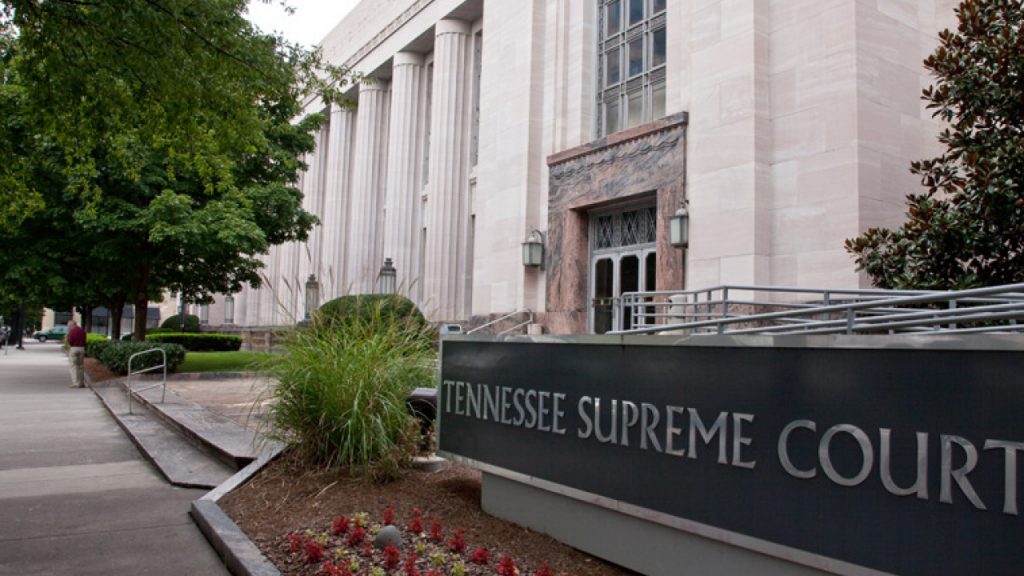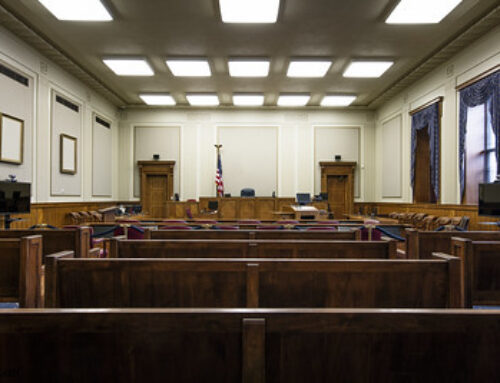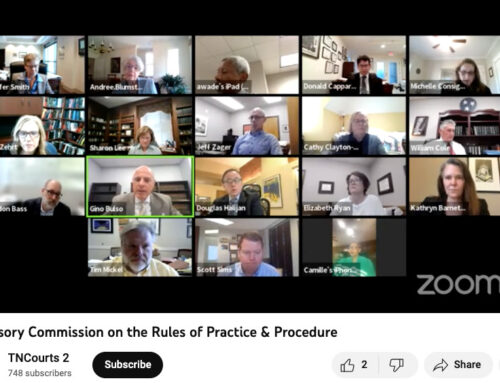TCOG, 55 others ask TN Supreme Court to protect open courts during COVID-19

Tennessee Coalition for Open Government and 55 other organizations and people ranging from news media to criminal justice groups to First Amendment experts have filed a petition with the Tennessee Supreme Court asking the court to take “immediate steps to protect the public’s Constitutional and common law right of access to court proceedings” during the COVID-19 epidemic.
Few of the 30 judicial district plans submitted and approved by the Supreme Court provide “any reasonable level of compliance” with the constitutional right of access, the petition states, and “several actually prohibit access to proceedings by anyone other than court personnel, parties, witnesses and lawyers, in direct violation of the Constitution.”
“Petitioners share the common belief that Tennessee courts cannot dispense justice without public confidence. Petitioners also agree that the public cannot and will not maintain confidence in the courts without aggressive efforts, especially in these unusual times, to maintain our courts’ traditional openness.”
The petition states that closing courts to the public “are only justified when they advance overriding interests and are no broader than necessary to serve that interest.”
“Petitioners appreciate that, due to the ongoing pandemic, as court proceedings resume, courts must take steps necessary to address public health concerns. Petitioners strongly believe that an outright ban on public access is, virtually by definition, constitutionally impermissible.”
Petition asks Supreme Court to use emergency powers to ensure open courts
The petition asks the Court to use its emergency powers to mandate that all Tennessee courts and judges allow Tennessee citizens to be present for in-person court proceedings — or, if public health concerns necessitate a limit on the number of people in a courtroom, accommodate the right of public access in other ways, such as by allowing the public to view or listen to proceedings by electronic means.
The petition also asks the Court to mandate that when courts hold electronic proceedings, they provide the public access to those proceedings and give clear notice about the availability of this access.
“Petitioners share the common believe that Tennessee courts cannot dispense justice without public confidence. Petitioners also agree that the public cannot and will not maintain confidence in the courts with aggressive efforts, especially in these unusual times, to maintain our courts’ traditional openness.”
Many judicial plans limit court access to parties in the case
The petition notes that the Tennessee Supreme Court itself has provided leadership on public access by example, livestreaming oral arguments on its YouTube channel.
However, the judicial plans submitted to the Supreme Court from across Tennessee provide little explanation on how public access will be provided as the courts resume in-person proceedings and increase electronic proceedings. TCOG analyzed those plans for public access and media access. The analysis can be viewed online in this Google spreadsheet and was provided to the Court.
The petition summarizes the analysis and states that:
“Plans for courts in at least 17 districts expressly prohibit access to in-person proceedings by anyone other than court personnel, parties, witnesses, lawyers, and sometimes victims, and make no provision for members of the media, thus prohibiting members of the public and the news media from attending (i.e., the 1st, 2nd, 5th, 6th, 9th, 10th, 11th, 13th, 14th, 15th, 16th, 17th, 18th, 23rd, 25th, 29th, and 31st districts). Plans for courts in several other districts appear to exclude by implication those who are not direct participants in a proceeding.
“Very few of these plans mention the public’s access right. Three plans (including the 21st, 24th, and 26th districts) refer to the importance of public access and these reserve one location or seat (and only one) for members of the media, on a first-come, first served basis.
“Only 10 plans (11th, 19th, 20th, 21st, 22nd, 24th, 26th, 27th, 28th and 30th districts) include any provisions for media access, and these provisions do not always apply to all courts covered in the plan. Some of these require compliance with Tenn. Supr. Ct. R. 30.
“Only two plans (11th and 20th districts) mentions access by the public and press to video conference proceedings, noting the authority of the court to mute such participants’ microphones.”
Other states provide clear guidance to protect public access to courts
The petition cites examples from Texas, Oklahoma, Georgia, Kentucky and Arizona that “have more directly addressed the challenge of public access and acted to accommodate this fundamental Constitutional right.”
For example, Kentucky’s Supreme Court included in its order regarding court operations during the COVID-19 pandemic a specific instruction to accommodate public access: “Access to view any courtroom proceeding that is not otherwise confidential must be provided to members of the public and media. Access may be provided by live audio or video or by digital
recording.”
Some of those courts also emphasized the need to provide “clear public notice of the availability of online access to court proceedings,” the petition states, so that the public knows of the alternative methods to access proceedings if they can’t be physically present.
The petitioners in the lawsuit in addition to Tennessee Coalition for Open Government include:
Petitioners include news media, criminal justice groups, others
Media associations and groups: Tennessee Association of Broadcasters, Tennessee Press Association, Reporters Committee for Freedom of the Press and the Middle Tennessee and East Tennessee chapters of the Society of Professional Journalists.
News media organizations: The Associated Press, The Bristol Herald Courier, The Chattanooga Times Free Press, The Cleveland Daily Banner, The Daily Herald (Columbia), The Tennessean, The Ashland City Times, The Daily News Journal (Murfreesboro), The Dickson Herald, The Fairveiw Observer, The Jackson Sun, The Leaf-Chronicle (Clarksville), The Oak Ridger, Murfreesboro Post, Wilson Post, Gallatin News, Hendersonville Standard, Portland Sun, Robertson County Connection, Dickson Post, Cheatham County Exchange, Main Street Clarksville, Main Street Nashville, Main Street Fairview, The Commercial Appeal (Memphis), MLK50: Justice Through Journalism, Nashville Public Radio, The Knoxville News-Sentinel, The Shelbyville Times Gazette, The Tennessee Lookout, WKRN-TV (Nashville), WBIR-TV (Knoxville), WRCB-TV (Chattanooga), WREG-TV (Memphis), WSMV-TV (Nashville), and WTVF NewsChannelFive (Nasvhille).
Good government, civil rights and criminal justice groups: American Civil Liberties Union of Tennessee, Choosing Justice Initiative, Court Watch Nashville, Free Hearts, Interdenominational Minister’s Fellowship, Just City, The League of Women Voters of Tennessee, Nashville Community Bail Fund, No Exceptions Prison Collective, Unheard Voices Outreach and Tennessee Justice Center.

Also joining the petition is the Tennessee Association of Criminal Defense Lawyers and two First Amendment authorities, Gautam Hans, the director of the Stanton Foundation First Amendment Clinic at Vanderbilt University Law School, and David L. Hudson, Jr., a First Amendment author and scholar and assistant professor at Belmont University School of Law.
Petitioners are represented by Memphis attorney Lucian T. Pera and the law firm of Adams and Reese LLP. Pera also serves as President of TCOG.




